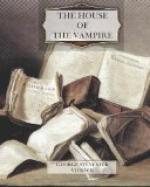“I am no weakling,” Ernest asserted, “and your picture of Clarke is altogether out of perspective. His splendid successes are to me a source of constant inspiration. We have some things in common, but I realise that it is along entirely different lines that success will come to me. He has never sought to influence me, in fact, I never received the smallest suggestion from him.” Here the Princess Marigold seemed to peer at him through the veil of the past, but he waved her aside. “As for my story,” he continued, “you need not go so far out of your way to find the leading character?”
“Who can it be?” Ethel remarked, with a merry twinkle, “You?”
“Ethel,” he said sulkingly, “be serious. You know that it is you.”
“I am immensely flattered,” she replied. “Really, nothing pleases me better than to be immortalised in print, since I have little hope nowadays of perpetuating my name by virtue of pencil or brush. I have been put into novels before and am consumed with curiosity to hear the plot of yours.”
“If you don’t mind, I had rather not tell you just yet,” Ernest said. “It’s going to be called Leontina—that’s you. But all depends on the treatment. You know it doesn’t matter much what you say so long as you say it well. That’s what counts. At any rate, any indication of the plot at this stage would be decidedly inadequate.”
“I think you are right,” she ventured. “By all means choose your own time to tell me. Let’s talk of something else. Have you written anything since your delightful book of verse last spring? Surely now is your singing season. By the time we are thirty the springs of pure lyric passion are usually exhausted.”
Ethel’s inquiry somehow startled him. In truth, he could find no satisfactory answer. A remark relative to his play—Clarke’s play—rose to the threshold of his lips, but he almost bit his tongue as soon as he realised that the strange delusion which had possessed him that night still dominated the undercurrents of his cerebration. No, he had accomplished but little during the last few months—at least, by way of creative literature. So he replied that he had made money. “That is something,” he said. “Besides, who can turn out a masterpiece every week? An artist’s brain is not a machine, and in the respite from creative work I have gathered strength for the future. But,” he added, slightly annoyed, “you are not listening.”
His exclamation brought her back from the train of thoughts that his words had suggested. For in his reasoning she had recognised the same arguments that she had hourly repeated to herself in defence of her inactivity when she was living under the baneful influence of Reginald Clarke. Yes, baneful; for the first time she dared to confess it to herself. In a flash the truth dawned upon her that it was not her love alone, but something else, something irresistable and very mysterious, that had dried up the well of creation in her. Could it be that the same power was now exerting its influence upon the struggling soul of this talented boy? Rack her brains as she might, she could not definitely formulate her apprehensions and a troubled look came into her eyes.




